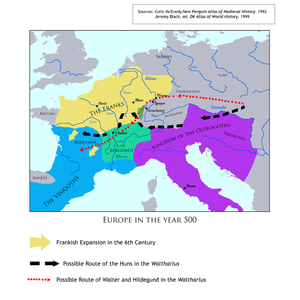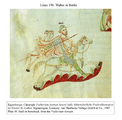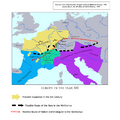Waltharius170
Walther leads the army of the Huns to victory in battle (170–214)
| Venerat interea satrapae certissima fama | 170 | Satrapae equiv. to Attilae
|
DDDSDS | |||
| Quandam, quae nuper superata, resistere gentem | Quandam…gentem: since the sudden rebellion is merely a crude plot device, the precise identity of the people is unimportant.
|
SSDDDS | ||||
| bellum Hunis confestim inferre paratam. | Aeneid 3.248: "bellumne inferre paratis"
|
SSSSDS Elision: confestim inferre Hiatus: bellum Hunis |
||||
| Tunc ad Waltharium convertitur actio rerum. | Actio rerum: “the leadership of the expedition”
|
SDSDDS | ||||
| Qui mox militiam percensuit ordine totam | SDSDDS | |||||
| Et bellatorum confortat corda suorum, | 175 | Confortat equiv. to confirmat
|
Liber Regum II 11.25: conforta bellatores. ‘Encourage thy warriors.’ Liber Genesis 18.5: confortate cor vestrum. ‘Strengthen ye your heart.’
|
SSSSDS | The language here recalls passages from Genesis ("confortate cor vestrum," 18:5) and II Kings ("conforta bellatores," 11.25). In the Genesis passage, Abraham is speaking to visiting angels. In the passage from II Kings King David is sending a message to his nephew Joab after the death of Uriah the Hittite. [AE] | |
| Hortans praeteritos semper memorare triumphos | SDSDDS | |||||
| Promittensque istos solita virtute tyrannos | Tyrannos equiv. to rebelles (here)
|
Prudentius, Psychomachia 155-156.: ‘vicimus,’ inquit,/ ‘exultans Vitium solita virtute.’ ‘ “We have overcome,” he said, “a proud Vice with our wonted virtue.” ’ Aeneid 11.415: quamquam o si solitae quicquam virtutis adesset! ‘If only we had any of our wonted valour!’
|
SSDSDS Elision: promittensque istos |
|||
| Sternere et externis terrorem imponere terris. | DSSSDS Elision: sternere et; terrorem imponere |
|||||
| Nec mora, consurgit sequiturque exercitus omnis. | Aeneid 11.597-598.: At manus interea muris Troiana propinquat,/ Etruscique duces equitumque exercitus omnis/ compositi numero in turmas. ‘But meanwhile the Trojan band draws near the walls, with the Etruscan chiefs and all their mounted array, marshalled by number into squadrons.’
|
DSDSDS Elision: sequiturque exercitus |
||||
| Ecce locum pugnae conspexerat et numeratam | 180 | The description of the battle that follows reworks a scene from the Aeneid (11.597 ff.) while attempting some limited level of verisimilitude in its depiction of medieval warfare. The warriors fight on horseback (a practice adopted by the Franks in Carolingian times), first with arrows and javelins from afar (the practice of the Hungarian Avars), and then in hand-to-hand combat with swords (not found in the scene from the Aeneid).
|
Aeneid 11.597-598.: At manus interea muris Troiana propinquat,/ Etruscique duces equitumque exercitus omnis/ compositi numero in turmas. ‘But meanwhile the Trojan band draws near the walls, with the Etruscan chiefs and all their mounted array, marshalled by number into squadrons.’
|
DSSDDS | Abram Ring suggests that the frequent use of “ecce” and “en,” which would be unusual in Classical Latin, may betray the influence of Prudentius. Alternatively, he writes, it might translate an interjection from the Germanic tradition, similar to the Anglo-Saxon “hwæt.” [AE]
The battle here is reminiscent of the battles in the Aeneid (like that at 11.597), but some features distinguish it as medieval. For instance, they fight on horseback, which is a Carolingian innovation. [AE] | |
| Per latos aciem campos digessit et agros. | Aeneid 11.599: compositi numero in turmas. . . ‘Marshalled by number into squadrons. . .’
|
SDSSDS | ||||
| Iamque infra iactum teli congressus uterque | Aeneid 11.608-609.: iamque intra iactum teli progressus uterque/ substiterat: subito erumpunt clamore. ‘And now in its advance each army had halted within a spear cast of the other; with a sudden shout they dash forth.’
|
|
SSSSDS Elision: iamque in |
|||
| Constiterat cuneus: tunc undique clamor ad auras | Aeneid 11.608-609.: iamque intra iactum teli progressus uterque/ substiterat: subito erumpunt clamore. ‘And now in its advance each army had halted within a spear cast of the other; with a sudden shout they dash forth.’
|
DDSDDS | ||||
| Tollitur, horrendam confundunt classica vocem, | Aeneid 9.566-567. undique clamor/ tollitur. ‘On all sides a shout goes up.’ 2.699: se tollit ad auras. ‘He raises himself to the airs.’
|
DSSSDS | ||||
| Continuoque hastae volitant hinc indeque densae. | 185 | Aeneid 11.612-613.: continuo. . . ‘At once. . .’ 11.610-611.: fundunt simul undique tela/ crebra nivis ritu. ‘Together from all sides they shower weapons as thick as snowflakes.’ 12.408-409.: spicula castris/ densa cadunt mediis. ‘Shafts fall thick in the middle of the camp.’ Georgics 2.142: galeis densisque virum seges horruit hastis. ‘The fields bristled with the helms and serried lances of warriors.’
|
DSDSDS Elision: H-ELISION: continuoque hastae |
|||
| Fraxinus et cornus ludum miscebat in unum, | Fraxinus et cornus: by metonymy, the wooden spears.
|
Aeneid 9.698: volat Itala cornus. ‘The Italian cornel shaft flies.’ 12.267: sonitum dat stridula cornus. ‘The whistling cornel shaft sings.’ 12.714: fors et virtus miscentur in unum. ‘Chance and valour blend in one.’
|
DSSSDS | |||
| Fulminis inque modum cuspis vibrata micabat. | In modum equiv. to instar
|
Aeneid 11.615-616.: excussus Aconteus/ fulminis in morem. . .praecipitat longe. ‘Flung off like a thunderbolt, Aconteus is hurled headlong far away.’
|
DDSSDS | |||
| Ac veluti boreae sub tempore nix glomerata | DDSDDS | The metaphor here assumes that both the poet and his expected audience were familiar with snow. Indeed, it suggests that they had not simply seen snow on faraway mountaintops but actually experienced snowstorms. In contrast, snow appears in the Aeneid only in line 4.238. Mercury is flying to Carthage, and on the way there he sees Atlas, whose shoulders are snow-covered. [AE] | ||||
| Spargitur, haud aliter saevas iecere sagittas. | DDSSDS | |||||
| Postremum cunctis utroque ex agmine pilis | 190 | SSSSDS Elision: utroque ex |
||||
| Absumptis manus ad mucronem vertitur omnis: | Prudentius Psychomachia 137: vertitur ad capulum manus. ‘Her ruthless hand turned to her sword-hilt.’
|
SDSSDS | ||||
| Fulmineos promunt enses clipeosque revolvunt, | Clipeosque revolvunt: variously explained. The warriors are either throwing back their shields or taking them up again having already done so, in preparation for combat (cf. restaurant in the following line).
|
Aeneid 4.579-580.: vaginaque eripit ensem/ fulmineum. ‘He snatches his flashing sword from its sheath.’ 9.441-442.: instat non setius ac rotat ensem/ fulmineum. ‘Onward none the less he presses, whirling his lightning blade.’
|
DSSDDS | |||
| Concurrunt acies demum pugnamque restaurant. | Aeneid 11.612-613.: adversis Tyrrhenus et acer Aconteus/ conixi incurrunt hastis primique ruinam/ dant sonitu ingenti perfractaque quadripedantum/ pectora pectoribus rumpunt; excussus Aconteus fulminis in morem. . .praecipitat longe. ‘At once Tyrrhenus and fierce Aconteus charge each other full force with spears, and are first to go down with a mighty crash, breaking and shattering their horses as they collide breast to breast. Flung off like a thunderbolt, Aconteus is hurled headlong far away.’ 10.360-361.: aciesque Latinae/ concurrunt. ‘The ranks of Latium clash.’
|
SDSSDS | ||||
| Pectoribus partim rumpuntur pectora equorum, | The thought of this line parallels that of the next: some of both the horses and the men were killed merely by being crushed against one another while armed in the stampede of battle.
|
Aeneid 11.612-613.: adversis Tyrrhenus et acer Aconteus/ conixi incurrunt hastis primique ruinam/ dant sonitu ingenti perfractaque quadripedantum/ pectora pectoribus rumpunt; excussus Aconteus fulminis in morem. . .praecipitat longe. ‘At once Tyrrhenus and fierce Aconteus charge each other full force with spears, and are first to go down with a mighty crash, breaking and shattering their horses as they collide breast to breast. Flung off like a thunderbolt, Aconteus is hurled headlong far away.’ 10.360-361.: aciesque Latinae/ concurrunt. ‘The ranks of Latium clash.’
|
DSSSDS Elision: pectora equorum |
|||
| Sternitur et quaedam pars duro umbone virorum. | 195 | Prudentius, Psychomachia 255-256.: hostem humilem cupiens inpulsu umbonis equini/ sternere. . . ‘Eager to upset her lowly enemy with the shock of her horse-hide shield. . .’
|
DSSSDS Elision: duro umbone |
|||
| Waltharius tamen in medio furit agmine bello, | Aeineid 11.762: qua se cumque furens medio tulit agmine virgo. . . ‘Wherever the maiden rides among the ranks in her fury. . .’
|
|
DDDDDS | |||
| Obvia quaeque metens armis ac limite pergens. | Aeineid 11.762: qua se cumque furens medio tulit agmine virgo. . . ‘Wherever the maiden rides among the ranks in her fury. . .’
|
DDSSDS | ||||
| Hunc ubi conspiciunt hostes tantas dare strages, | Aeneid 9.783-784.: unus homo et vestris, o cives, undique saeptus/ aggeribus tantas strages. . .ediderit? ‘My countrymen, shall one man, hemmed in on every side by your ramparts, deal such carnage?’ Georgics 3.246-247.: nec funera vulgo/ tam multa informes ursi stragemque dedere. ‘Never does the shapeless bear spread death and havoc so widely.’
|
DDSSDS | ||||
| Ac si praesentem metuebant cernere mortem, | Ac si: qualifying praesentem, not beginning a clause.
|
Aeneid 1.91: praesentemque viris intentant omnia mortem. ‘All forebodes the sailors’ instant death.’
|
SSDSDS | |||
| Et quemcunque locum, seu dextram sive sinistram, | 200 | Aeneid 3.563: laevam cuncta cohors. . .petivit. ‘Leftward all our force plied.’
|
SDSSDS | |||
| Waltharius peteret, cuncti mox terga dederunt | Aeneid 3.563: laevam cuncta cohors. . .petivit. ‘Leftward all our force plied.’
|
DDSSDS | ||||
| Et versis scutis laxisque feruntur habenis. | Versis scutis: they put their shields on their backs to protect them as they flee.
|
Aeneid 9.686: agminibus totis qut versi terga dedere. ‘With all their columns [they] are routed and turn to flight.’
|
SSSDDS | |||
| Tunc imitata ducem gens maxima Pannoniarum | Aeneid 11.758-759.: ducis exemplum eventumque secuti/ Maeonidae incurrunt. ‘Following their chief’s example and success, Maeonia’s sons attack.’
|
|
DDSDDS | |||
| Saevior insurgit caedemque audacior auget, | Aeneid 12.902: altior insurgens. . . ‘Rising to his height. . .’ Prudentius, Psychomachia 31: altior insurgens.
|
DSSSDS Elision: caedemque audacior |
||||
| Deicit obstantes, fugientes proterit usque, | 205 | Prudentius, Psychomachia Praefatio 28: pellit fugatos, sauciatos proterit. ‘[He] drives off in flight those proud kings. . .or cuts them down.’
|
DSDSDS | |||
| Dum caperet plenum belli sub sorte triumphum. | Belli sub sorte: “in the outcome of the battle”
|
Prudentius, Psychomachia 474: belli sub sorte. . . ‘By the luck of war. . .’
|
DSSSDS | |||
| Tum super occisos ruit et spoliaverat omnes. | DSDDDS | |||||
| Et tandem ductor recavo vocat agmina cornu | Aeineid 7.513-514.: cornuque recurvo/ Tartaream intendit vocem. ‘On the twisted horn [she] strains her hellish voice.’ 3.239: dat signum specula Misenus ab alta/ aere cavo. ‘Misenus on his hollow brass gave the signal from his watch aloft.’ Prudentius, Psychomachia 422: recavo misceret labra palato. ‘[She] beats the lips into the arched mouth.’ Aeneid 7.508: vocat agmina Tyrrhus. ‘Tyrrhus summons his bands.’
|
SSDDDS | ||||
| Ac primus frontem festa cum fronde revinxit, | Aeneid 5.71-72.: ‘. . .cingite tempora ramis.’/ Sic fatus velat materna tempora myrto./ hoc Helymus facit, hoc aevi maturus Acestes/ hoc puer Ascanius, sequitur quos cetera pubes. ‘ “. . .Weathe your brows with leaves.” So speaking, he crowns his brows with his mother’s myrtle. Thus does Helymus, thus Acestes, ripe of years, thus the boy Ascanius, the rest of the youth following.’ 7.614: sequitur tum cetera pubes. ‘Then the rest of the warriors take up the cry.’ 4.459: velleribus niveis et festa fronde revinctum. . . ‘Wreathing it with snowy fleeces and festal foliage. . .’
|
SSSSDS | ||||
| Victrici lauro cingens sua timpora vulgo, | 210 | Timpora equiv. to tempora
|
Aeneid 5.71-72.: ‘. . .cingite tempora ramis.’/ Sic fatus velat materna tempora myrto./ hoc Helymus facit, hoc aevi maturus Acestes/ hoc puer Ascanius, sequitur quos cetera pubes. ‘ “. . .Weathe your brows with leaves.” So speaking, he crowns his brows with his mother’s myrtle. Thus does Helymus, thus Acestes, ripe of years, thus the boy Ascanius, the rest of the youth following.’ 7.614: sequitur tum cetera pubes. ‘Then the rest of the warriors take up the cry.’ 4.459: velleribus niveis et festa fronde revinctum. . . ‘Wreathing it with snowy fleeces and festal foliage. . .’
|
SSSDDS | The laurels mentioned here are likely meant to be taken as a Classical reference, rather than as a literal description of the homecoming. The bay laurel, from which laurel wreaths are typically made, is a Mediterranean plant, and it would have a hard time surviving in northern Europe. Even then, the plant would have had to be imported, because it is not native. It is more likely that the poet refers to laurels but means a more cold-hearty plant. [AE] | |
| Post hunc signiferi, sequitur quos cetera pubes. | SDDSDS | |||||
| Iamque triumphali redierunt stemmate compti | DSDSDS | |||||
| Et patriam ingressi propria se quisque locavit | DSDSDS Elision: patriam ingressi |
|||||
| Sede, sed ad solium mox Waltharius properavit. | DDSDDS |




